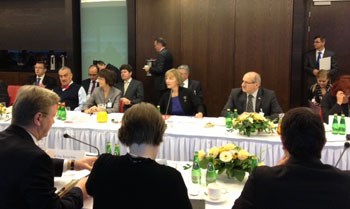- Published: 25.10.2012.
Pusić in Warsaw attends conference of Visegrad Group and region’s foreign ministers
Opening the conference, the host, Polish Foreign Minister Radoslaw Sikorski said there was increasingly more talk about enlargement fatigue and diminishing attractiveness of the EU, which is facing problems itself. He said the EU which the countries of the Western Balkans would join “will not be the same as today”
Opening the conference, the host, Polish Foreign Minister Radoslaw Sikorski said there was increasingly more talk about enlargement fatigue and diminishing attractiveness of the EU, which is facing problems itself. He said the EU which the countries of the Western Balkans would join “will not be the same as today”.
Poland assumed the Visegrad Group’s presidency in July this year, and its priorities include cooperation within the EU, transatlantic and international cooperation, the Western Balkans and the Eastern Partnership.
Enlargement Commissioner Štefan Füle said that the new accession model (the most challenging chapters, 23 and 24, are being opened first) would benefit the negotiating countries, as they would reform and transform for the better. He added that the key was in continuous work and implementation of reforms. “We want a one-speed Europe”, Füle said.
The foreign ministers of Montenegro and Macedonia and the European integration minister of Kosovo talked about the difficulties their countries were faced with.
Pusić pointed out that through the Centre of Excellence and seminar Croatia was transferring it knowledge and experience to the countries in the region. “We have held two training in Mostar and Sarajevo respectively, and plan on holding two more by the year’s end,” Pusić said, adding that Croatia had signed an Agreement on Cooperation in Euro-Atlantic Integration with Montenegro, while the same agreement with Bosnia and Herzegovina was in the works.
Bulgarian Foreign Minister Nickolay Mladenov said the EU should continue with the enlargement, although it was no longer at the top of the agenda, as it was important not only for the countries of the region, but for the EU as well.
The attending parties continued the discussion at a working lunch.



